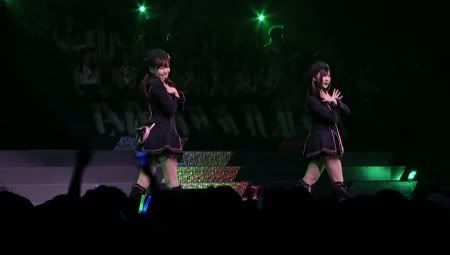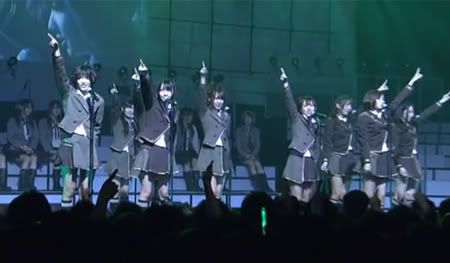"Tonari no banana" (The banana on the other side)
(from Himawari-gumi 2nd stage "Yume wo shinaseru wake ni ikanai")
Himawari-gumi (Kasai Tomomi, Ono Erena / Kobayashi Kana, Oku Manami)
words: Akimoto Yasushi
music: Maeyamada Ken'ichi
point of view: female (two people)
theme: teenage song
original lyrics

listen to Tonari no banana on youtube
Banana banana...
"Even if I look like this, I'm quite an adult
I wear clothes that make me look more slender than I actually am, but I'm surprisingly glamorous nonetheless...
I wear adult makeup, and I have quite a bit of experience in love, too... Yeah!"
"You're still a little kid
You just look pretentious
Baby, go home"
The banana on the other side of the fence is too green
Friends who have no secrets are boring
Doing this and that, we ripen
We hope we'll turn into delicious bananas... V!
"They call people like me 'adults'
I even know the name of the American president,
the characters for the word 'sasuga (as expected)', and I worry about the pension problem... Yeah!"
"But you cry for horror movies
And you eat your sushi without wasabi
Baby, stop pretending you're older"
The banana on the other side of the fence is hard to peel
The skin that protects it is too hard
It will turn sweeter just thanks to curiosity
We hope we'll turn into delicious bananas... Yes!
"The other day I had free time so I read the morning newspaper.
Aren't I an adult?"
"People who can eat the skin of eels are adults, aren't they?"
The banana on the other side of the fence is hard to peel
The skin that protects it is too hard
We, too, one day,
Will be delicious bananas...
The banana on the other side of the fence is too green
Friends who have no secrets are boring
Doing this and that, we ripen
Please eat us, two delicious bananas... V!
NOTES
- "Tonari no banana" literally means "The neighbour's banana" (cough...) or "The banana next to me", but when we see it in the context of each chorus's first line, it's actually a pun over the saying "Tonari no shiba wa aoku mieru", which is none other than the good old "The grass is greener on the other side of the fence". "Aoi" (green) might also mean "unripen" when referred to fruits.
- "V!" at the end of the chorus stands for "victory". It doesn't have a particular meaning here, just like "yeah".
- Tomomi claims I know the characters for the word 'sasuga'. "Sasuga" ("as expected") is a fairly common word but it's usually written in hiragana, the Japanese 'alphabet'. Being able to write it in kanji characters is not a common feat, especially among youngsters.
- In the second part, Erena reveals that Tomomi still eats sushi without wasabi (and grilled eel without its greasy skin, to mention another part of the song). Wasabi is considered a food for adults since it's so hot, but, unlike Western sushi places where it's served at the side, Japanese sushi has a thin layer of wasabi spread between the fish and rice, so you have to order a wasabi-less sushi expressedly.
Comment
The question from the person who requested this song was:
I was wondering if you could analyze tonari no banana sometime if you have the chance xD I love that song and I know it's got a kind of adult edge to it (my friend from japan started laughing when she heard the lyrics) but I want to know in a more concrete sense why it's more adult.Well, if we look at the song literally, we have two girls talking to each other about acting grownup while they're actually still young girls. It looks quite innocent.
But the sexual innuendo is clearly there, albeit in a jokingly way. I think "banana" in this case doesn't stand for what you all are thinking about right now, but for a sexually mature girl. The girls singing are still "unripe", the "skin" protects the fruit inside them; and the fruit can only ripen thanks to curiosity (quite obviously, the sexual curiosity most teenagers feel).
For once, this is an AKB song about virginity that doesn't talk about girls wanting to give it away as soon as possible, but contains hints about giving oneself time to grow up without acting like an adult, and only then do it.
